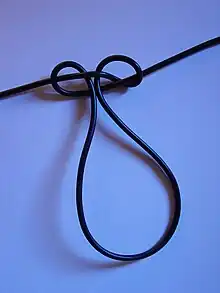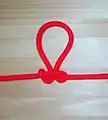| Artillery loop | |
|---|---|
 | |
| Names | Artillery loop, Artilleryman's knot, Manharness knot,[1] Manharness loop, Harness loop,[2] Harness hitch,[2] Belayer's hitch[3] Douglass knot[4] |
| Category | Loop |
| Related | Farmer's loop, Alpine butterfly knot, Span loop, Marlinespike hitch |
| Releasing | Non-jamming |
| Caveat | Must have load, may slip unexpectedly under tension creating a running knot or noose |
| ABoK | #153, #428, #532,[5] #1050, #1051 |
The artillery loop[1] is a knot with a loop on the bight for non-critical purposes. The artillery loop must have the loop loaded or it will slip and contract easily. It is an inferior knot to the alpine butterfly knot,[2] possibly dangerously so, in that it can be yanked out of shape and turn into a running knot or noose.[6]
Budworth states that this knot is often described as being best suited to take a load on only one of the ends, but reliable information on which end is difficult to find.[7]
Tying the knot
 Artillery loop step by step
Artillery loop step by step Finished Artillery loop
Finished Artillery loop
Usage
The name harness loop derives from the fact that the knot was used when assisting horses on difficult terrain.[7] Similarly, the name artillery loop or artilleryman's hitch derives from the fact that it was used when hauling field artillery into position.[7]
See also
Notes and references
- 1 2 Ashley, Clifford W. (1944), The Ashley Book of Knots, New York: Doubleday, p. 32
- 1 2 3 Ashley, Clifford W. (1944), The Ashley Book of Knots, New York: Doubleday, p. 191
- ↑ Gregory, John Forrest (1989). Rock sport: tools, training, and techniques for climbers (1st ed.). US: Stackpole books. p. 41. ISBN 0811722961.
- ↑ "Knotting Matters". No. 77. International Guild of Knot Tyers. p. 35. ISSN 0959-2881.
{{cite magazine}}: Cite magazine requires|magazine=(help) - ↑ Entry #532 on page 87 of The Ashley Book of Knots shows a diagram of the alpine butterfly knot under the name harness loop. Ashley appears to have illustrated or named the incorrect knot in this case. The butterfly knot, under the name Lineman's Loop, is shown and discussed as a distinct and specific knot throughout the rest of the book.
- ↑ Cyrus Lawrence Day (1986), The Art of Knotting and Splicing (4th ed.), Annapolis: Naval Institute Press, pp. 80–81
- 1 2 3 Budworth, Geoffrey (2012). The Knot Book. London: Constable & Robinson. p. 106. ISBN 978-0716023043.
External links